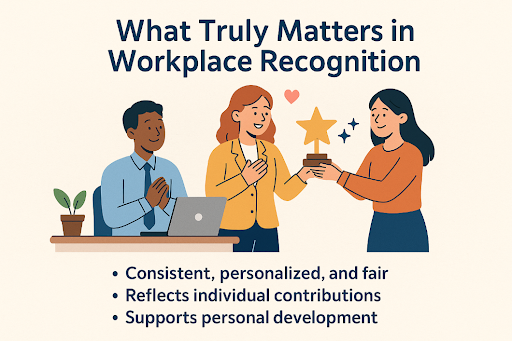While casual Fridays and ping-pong tournaments can offer a quick morale boost, they fail to meet the deeper needs of today’s workforce.
Genuine appreciation can not be a one-off event; it is part of an organization’s culture and should be reflected in how teams collaborate, how leaders listen, and how individuals grow within their roles.
While casual Fridays and ping-pong tournaments can offer a quick morale boost, they fail to meet the deeper needs of today’s workforce. Employees increasingly see these gestures as hollow, preferring fair treatment, psychological safety, and a culture that prioritizes wellbeing over gimmicks.
The once-popular pizza party has become a symbol of empty, performative workplace recognition. A study from Western Michigan University found that many employees view traditional pizza parties as “childlike or infantilizing.”
When leaders rely on such events, it can feel less like recognition and more like a distraction.
The study also underscores what employees have come to expect: to be seen, supported, and valued in consistent, meaningful ways (not just at the end of a quarter or in moments when leadership hopes to gloss over deeper issues). This sends a clear message that a slice of pizza cannot fix a toxic workplace.
However, in a workplace where recognition is embedded (and sincere), even pizza parties can serve a purpose, but only when they complement rather than try to replace a culture of care and appreciation.
Workplace Recognition Must Evolve
Superficial rewards can provide a quick morale boost but rarely lead to sustained engagement. Furthermore, they often disregard individual needs or contributions by clashing with dietary, religious, and lifestyle restrictions (or simply lacking a personal touch).
When perks are used to distract from systemic issues, such as weak communication or low trust, they quickly lose impact. Clinging to outdated recognition tactics can ultimately lead to serious consequences, including employee disengagement and increased turnover.
However, replacing these initiatives with regular, genuine employee appreciation can improve retention, morale, and performance.
Andrew Farah, CEO of Density, underscored this point in a recent Allwork.Space podcast. Farah says that vague policies can leave people disconnected and disengaged. The same can be said about vague recognition policies and tokenistic rewards that lack meaningful intention: they leave employees feeling overlooked.
Some companies, however, have not canceled fun; they simply ensure that fun activities are part of a larger, more meaningful approach to the employee experience and that recognition is intentional and grounded in core values.
Here are three companies setting the standard and showing what meaningful appreciation looks like in action:
- Salesforce combines real-time appreciation with structured recognition, using Slack and Chatter to highlight achievements frequently and authentically.
- Zappos made recognition playful with “Zollars” — an internal currency that employees gift one another and can be redeemed for experiences or desirable company merchandise.
- Buffer, a fully remote team, prioritizes positivity and transparency. They ensure everyone feels seen by leveraging both digital and offline recognition tools.
Appreciation that Matters
When recognition is purely performative, it eventually creates a void that no amount of pizza parties can fill. Meaningful recognition is not about grand gestures; it’s about how people are treated every day and how they, in turn, treat each other.
When recognition is grounded in shared values, it becomes lasting, morale-boosting, and helps build a strong team identity.
To become truly embedded in workplace culture, recognition needs to be consistent, personalized, and fair/equitable. It should also reflect individual contributions and support personal development.
When executed in this way, recognition reinforces the behaviors and efforts that drive an organization forward. Research also shows that receiving gratitude can boost individual mental wellbeing and contribute to positive outcomes, such as increased job satisfaction.

Meaningful recognition is not built on assumptions about what people want, but rather rooted in listening, understanding, and delivering what truly matters to each team member. And it starts with leadership.
Culture is shaped by the daily actions of leaders: how they respond when no one’s watching, how they handle feedback, and which behaviors they choose to recognize and elevate.
Ideas for Team-Based, Values-Aligned Rewards
Here are a few meaningful ways to build consistent, values-driven habits into your team culture:
- Peer Nominations for embodying core team values (for example, integrity, curiosity, generosity), not just for hitting performance targets.
- Collective Milestone Rewards, where teams choose how to celebrate together: a creative workshop, a donation to a shared cause, or a meaningful shared experience.
- Storytelling Spotlights that go beyond the what to highlight the why behind someone’s work and its impact.
- Personalized Allowances, such as learning stipends, dedicated project development time, or meaningful time off (aligned with individual and team priorities).
Meaningful Food Perks
While free food can create moments of connection, it’s no substitute for addressing deeper structural challenges. In times of low morale or broken trust, it risks coming across as tone-deaf or even infantilizing.
Certain food initiatives (for instance, a nutritious lunch, snack bar, or cooking event), however, can play a role in building a healthy company culture. Furthermore, studies show that employees on unhealthy diets are 66% more likely to experience productivity dips, making the provision of nutritious food options at work a strategic investment.
When a range of (mainly healthy) food is offered in workplaces already grounded in inclusion, fairness, and wellbeing, it becomes a way of bringing people together.
However, when employers routinely offer treats such as pizza or cake in place of genuine recognition and a supportive culture, it reveals a lack of meaningful investment in employees’ overall wellbeing.
Remote Recognition
Hybrid and remote setups can make recognition challenging, but not impossible. The key is understanding that people cannot feel seen if there are no opportunities to be seen. That’s why consistency and visibility are essential, especially in remote work settings.
Here are some proven, practical ways to ensure recognition remains meaningful, no matter the distance:
- Recognition Channels or Virtual Kudos Walls (on Slack or Teams) that ensure praise is shared consistently and visibly.
- Handwritten Notes or Care Packages, not just a “great job!” emoji.
- Video Messages or Digital Praise Boards for asynchronous shout-outs.
- Manager Touch Points that build recognition into weekly check-ins.
- Rotating Spotlights that invite people to share recent wins across time zones.
Time to Move On from the Pizza Party
Appreciation cannot be outsourced to perks. Pizza parties and similar gestures have their place, but they are not a substitute for a culture of genuine recognition.
People thrive in workplaces where recognition is consistent, sincere, and tied to what truly matters — growth opportunities, flexibility, and shared success.
When appreciation is embedded into the everyday fabric of the employee experience, it builds trust, engagement, and long-term commitment.
The issue isn’t the pizza; it’s when the pizza is doing the heavy lifting for culture.
Based in London, U.K., Sheya Michaelides is a freelance writer, researcher and former teacher dedicated to exploring the intersections between psychology, employment, and education – focusing on issues related to the future of work, wellbeing and diversity, equality, and inclusion (DEI). With a varied employment background across the public and private sectors, Sheya brings a nuanced perspective to her work. She holds an undergraduate degree in Organizational Psychology and Industrial Sociology and a first-class Master’s degree in Applied Psychology. This article first appeared on allwork.space.

























